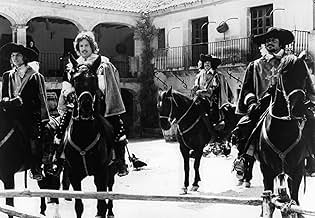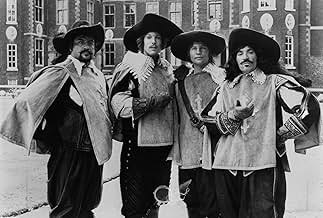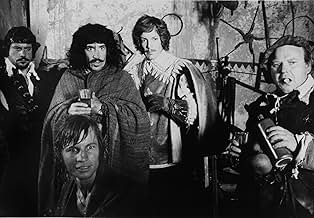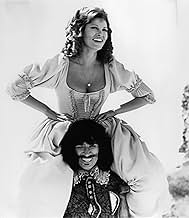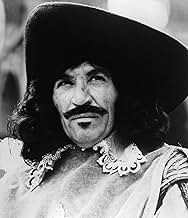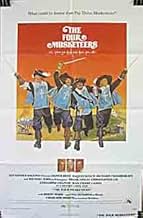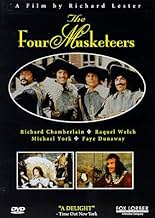NOTE IMDb
6,9/10
12 k
MA NOTE
Les Quatre Mousquetaires défendent la reine et sa couturière contre le Cardinal de Richelieu et Milady de Winter.Les Quatre Mousquetaires défendent la reine et sa couturière contre le Cardinal de Richelieu et Milady de Winter.Les Quatre Mousquetaires défendent la reine et sa couturière contre le Cardinal de Richelieu et Milady de Winter.
- Réalisation
- Scénario
- Casting principal
- Nommé pour 1 Oscar
- 1 victoire et 2 nominations au total
Jean-Pierre Cassel
- Louis XIII
- (as Jean Pierre Cassel)
Ángel del Pozo
- Jussac
- (as Angel Del Pozo)
Avis à la une
10vox-sane
Don't watch this movie alone. That is, watch Richard Lester's "The Three Musketeers" with it. The two are actually the same film, shot simultaneously (in fact, the cast thought they were making one long movie, to the extent that they were *paid* for one movie; they later sued, as well they should have). In fact, one who hasn't seen Lester's "Three Musketeers" might not understand this movie. Videos and DVDs should be released only in a double-box.
Most "Musketeer" movies are travesties loosely based on Dumas. The 1993 version with Chris O'Donnell is a case in point. It uses little more than the names of characters, and it's woefully inadequate.
The script-writer in Lester's "Musketeers" movies was George MacDonald Fraser, author of the "Flashman" series. And Fraser, unlike writers of all other "Musketeer" movies, seems to have read the book. Some of the wildest things in both movies (for instance, Buckingham's shrine to Anne of Austria) are actually from Dumas. The script, rambunctious and silly as sometimes is, is startlingly close to the book.
Rumor has it that Lester envisioned "Musketeers" as a project for the Beatles. If this is true, he's fortunate he lost them. The cast is uniformly wonderful. Oliver Reed, Richard Chamberlain, and Frank Finlay are perfect in their roles (Finlay is particularly marvelous as he, not a large man, is able to portray the huge, blustering Porthos). Michael York is a fun D'artagnan. Faye Dunaway and Christopher Lee are suitably evil. Rachel Welch, the Pamela Anderson of the late '60s, shows a flair for light comedy that was not often utilized (most of her other movies highlight her . . . ahem . . . other talents). Charlton Heston is the anchor at the center of the film as the scheming Richelieu. He doesn't have much screen time, but his presence dominates the movies, as well it should. Lester also has small parts filled with amazing talents, including Spike Milligan and Roy Kinnear. Keep your eye on a genuine Frenchman, Jean-Pierre Cassel, as the king (and, much later, in Lester's "Return of the Musketeers", as Cyrano); he's a delight in every scene.
Lester's locations are fabulous. His France looks lived-in. One gets the sense of a long, medieval period that has decayed by the time of D'artagnan in the early 1600s, and of a struggling monarchy dominated by the Cardinal trying to rebuild it. Even Cardinal Richelieu, who wasn't really evil, comes off as three-dimensional (compare Heston's subtle performance to Tim Curry's bizarre, anti-historical, one-dimensional inquisitor and fool in the 1993 version).
Being "The Three (Four) Musketeers", there are many sword-fights; Lester somehow is not a great action director, but he somehow manages to make each duel unique, and funny. In "The Four Musketeers" he's given us a duel on the ice between York and Lee that's very funny. And the climactic duel in a church is sublime.
In 1989 Lester released "Return of the Musketeers" with the same cast. Fraser's brief script for that movie (about 100 minutes) gives us the gist of "Twenty Years After", and is quite amusing and a good coda for the series (it's a shame Lester didn't get a chance to do "The Man in the Iron Mask" with a G. M. Fraser script and the same cast. The version with Jeremy Irons and John Malkovich will do, though it's darker and less loyal to Dumas).
On the whole, "The Three Musketeers" and "The Four Musketeers" are the best Musketeer movies ever made. They star men and women who were at the top of their profession at the time. The scripts are superb and there's not a wasted moment. Do not accept lesser substitutes.
Most "Musketeer" movies are travesties loosely based on Dumas. The 1993 version with Chris O'Donnell is a case in point. It uses little more than the names of characters, and it's woefully inadequate.
The script-writer in Lester's "Musketeers" movies was George MacDonald Fraser, author of the "Flashman" series. And Fraser, unlike writers of all other "Musketeer" movies, seems to have read the book. Some of the wildest things in both movies (for instance, Buckingham's shrine to Anne of Austria) are actually from Dumas. The script, rambunctious and silly as sometimes is, is startlingly close to the book.
Rumor has it that Lester envisioned "Musketeers" as a project for the Beatles. If this is true, he's fortunate he lost them. The cast is uniformly wonderful. Oliver Reed, Richard Chamberlain, and Frank Finlay are perfect in their roles (Finlay is particularly marvelous as he, not a large man, is able to portray the huge, blustering Porthos). Michael York is a fun D'artagnan. Faye Dunaway and Christopher Lee are suitably evil. Rachel Welch, the Pamela Anderson of the late '60s, shows a flair for light comedy that was not often utilized (most of her other movies highlight her . . . ahem . . . other talents). Charlton Heston is the anchor at the center of the film as the scheming Richelieu. He doesn't have much screen time, but his presence dominates the movies, as well it should. Lester also has small parts filled with amazing talents, including Spike Milligan and Roy Kinnear. Keep your eye on a genuine Frenchman, Jean-Pierre Cassel, as the king (and, much later, in Lester's "Return of the Musketeers", as Cyrano); he's a delight in every scene.
Lester's locations are fabulous. His France looks lived-in. One gets the sense of a long, medieval period that has decayed by the time of D'artagnan in the early 1600s, and of a struggling monarchy dominated by the Cardinal trying to rebuild it. Even Cardinal Richelieu, who wasn't really evil, comes off as three-dimensional (compare Heston's subtle performance to Tim Curry's bizarre, anti-historical, one-dimensional inquisitor and fool in the 1993 version).
Being "The Three (Four) Musketeers", there are many sword-fights; Lester somehow is not a great action director, but he somehow manages to make each duel unique, and funny. In "The Four Musketeers" he's given us a duel on the ice between York and Lee that's very funny. And the climactic duel in a church is sublime.
In 1989 Lester released "Return of the Musketeers" with the same cast. Fraser's brief script for that movie (about 100 minutes) gives us the gist of "Twenty Years After", and is quite amusing and a good coda for the series (it's a shame Lester didn't get a chance to do "The Man in the Iron Mask" with a G. M. Fraser script and the same cast. The version with Jeremy Irons and John Malkovich will do, though it's darker and less loyal to Dumas).
On the whole, "The Three Musketeers" and "The Four Musketeers" are the best Musketeer movies ever made. They star men and women who were at the top of their profession at the time. The scripts are superb and there's not a wasted moment. Do not accept lesser substitutes.
This film is part two of the movie "Three and Four Musketeers".
This film is somewhat more serious in tone as is warranted by the events described in the book. Not quite as fun as the first movie but true to the classic story writen by Dumas back in 1850.
(additional comments are duplicate comments made about the Three Musketeers)
This set of films (3 and 4 Musketeers were filmed at the same time and released 8 months apart) ranks right up there with "Raiders of the Lost Ark" and "Robin Hood" (with Erol Flynn) as one of the best in its genre (action/adventure). As an historian, I enjoyed the small touches of historical accuracy in the film. As far as I can tell, everything is just about bang-on: the costumes, the settings, the weapons, the street life, and the musketeers themselves (and yes I know the story is not "true"). The two films are quite faithful to the classic book by Alexander Dumas given some small and reasonable changes.
The sword-play in the film is the greatest! The initial duel against the Cardinal's men in the Convent is a masterpiece of choreographed combat. The battle that takes place early in the second film is hysterically funny as our heroes try to eat lunch in the middle of a war.
The actors and actresses are all wonderful, especially Michael York, Oliver Reed, Faye Dunaway, and Charlton Heston. One small weakness in the film is that it does not have the time or interest in describing how Milady de Winter seduces her jailor. I suggest reading the book to get a full understanding of that sequence of events.
Be warned, prolonged exposure to this film is likely to result in a desire for fencing lessons and historical reenactments.
Bottom line: A great film.
This film is somewhat more serious in tone as is warranted by the events described in the book. Not quite as fun as the first movie but true to the classic story writen by Dumas back in 1850.
(additional comments are duplicate comments made about the Three Musketeers)
This set of films (3 and 4 Musketeers were filmed at the same time and released 8 months apart) ranks right up there with "Raiders of the Lost Ark" and "Robin Hood" (with Erol Flynn) as one of the best in its genre (action/adventure). As an historian, I enjoyed the small touches of historical accuracy in the film. As far as I can tell, everything is just about bang-on: the costumes, the settings, the weapons, the street life, and the musketeers themselves (and yes I know the story is not "true"). The two films are quite faithful to the classic book by Alexander Dumas given some small and reasonable changes.
The sword-play in the film is the greatest! The initial duel against the Cardinal's men in the Convent is a masterpiece of choreographed combat. The battle that takes place early in the second film is hysterically funny as our heroes try to eat lunch in the middle of a war.
The actors and actresses are all wonderful, especially Michael York, Oliver Reed, Faye Dunaway, and Charlton Heston. One small weakness in the film is that it does not have the time or interest in describing how Milady de Winter seduces her jailor. I suggest reading the book to get a full understanding of that sequence of events.
Be warned, prolonged exposure to this film is likely to result in a desire for fencing lessons and historical reenactments.
Bottom line: A great film.
Athos, Porthos, Aramis and D'Artagnan are back; or more precisely, are still here; for the second half of the Dumas novel. As I'm sure most fans know, this was meant to be part of the complete Three Musketeers, before the Salkinds split it into two films. This led to much litigation and the creation of the "Salkind clause" in movie contracts.
Spoliers-The film takes up where the first part left off; D'Artagnan and the Musketeers have saved the Queen from embarassment and confounded the evil Cardinal Richelieu. D'Artagnan is now a full fledged Musketeer (although, in the novel, he was still just a guardsman).
Now the Cardinal hatches a new plot to persuade the Duke of Buckingham from joining the protestant Huguenot rebels at the city of La Rochelle. Milady is sent to persuade him to change his mind or kill him. Although Buckingham imprisons her, he underestimates the power of her charms. The Duke meets a tragic end and Milady returns to France to seek her revenge on D'Artagnan.
Meanwhile, D'Artagnan rescues his mistress Constance and places her in safekeeping. He learns the true identity of Milady and the mystery behind Athos' melancholy.
The Musketeers are sent to fight at La Rochelle and uncover the Cardinal's plot to kill Buckingham. Although the other Musketeers care little, D'Artagnan owes a debt to Buckingham and tries to stop the plot.
D'Artagnan pays a terrible price for his efforts, but emerges as a lieutenant of the Musketeers. He has taken his place as the leader of the group, but will find little solace in his promotion.
As with the first film, the performances are spot on. Everything is the same, as it was filmed at the same time. It is best viewed as a whole with the Three Musketeers.
Spoliers-The film takes up where the first part left off; D'Artagnan and the Musketeers have saved the Queen from embarassment and confounded the evil Cardinal Richelieu. D'Artagnan is now a full fledged Musketeer (although, in the novel, he was still just a guardsman).
Now the Cardinal hatches a new plot to persuade the Duke of Buckingham from joining the protestant Huguenot rebels at the city of La Rochelle. Milady is sent to persuade him to change his mind or kill him. Although Buckingham imprisons her, he underestimates the power of her charms. The Duke meets a tragic end and Milady returns to France to seek her revenge on D'Artagnan.
Meanwhile, D'Artagnan rescues his mistress Constance and places her in safekeeping. He learns the true identity of Milady and the mystery behind Athos' melancholy.
The Musketeers are sent to fight at La Rochelle and uncover the Cardinal's plot to kill Buckingham. Although the other Musketeers care little, D'Artagnan owes a debt to Buckingham and tries to stop the plot.
D'Artagnan pays a terrible price for his efforts, but emerges as a lieutenant of the Musketeers. He has taken his place as the leader of the group, but will find little solace in his promotion.
As with the first film, the performances are spot on. Everything is the same, as it was filmed at the same time. It is best viewed as a whole with the Three Musketeers.
I am not a great fan of Dick Lester's films, because there are not my cup of tea, but I must admit that he has hos own trade mark. I could easily recognize any of his movies any time. my favourite is ROBIN AND MARIAN, which is also one of his darkest. and in this film, FOUR MUSKETEERS, you have many elements in common with ROBIN AND MARIAN. Visual and directing effects that are Lester's touch. I would have imagined him directing DON QUICHOTTE as Terry Gillima did. At last for him !!!! Yes I could say hat Richard Lester are quite similar in style directors.
Although filmed together, the producers decided to release this adaptation of the Dumas classic in two parts, with this being the sequel to the 1973 film. The first film meandered initially before the main story line of the queen's diamond kicked in. Here too the film gets off to a rambling start. Unfortunately, things don't quite come together like they did in the first film. There is less of a sense of fun here, as the mood has darkened, which is not a bad thing except that the narrative is not very well sustained. While Welch was the female focus in the first film, this one belongs to Dunaway, who is excellent as the evil Milady.
Le saviez-vous
- AnecdotesCardinal Richelieu (Charlton Heston) says to d'Artagnan (Michael York) that he has no personal enemies, only enemies of France. This line is in neither the original novel nor the script. Charlton Heston came across this quote of the Cardinal's when researching the role, and asked director Richard Lester to find a place to include it in this movie.
- GaffesAfter Felton leaves Milady's cell in the Tower of London, he stops to take a drink of water from a metal tap/facet, these types of taps weren't invented for at least another two hundred years...
- Citations
Porthos: You know, it strikes me that we would be better employed wringing Milady's pretty neck than shooting these poor devils of Protestants. I mean, what are we killing them for? Because they sing psalms in French and we sing them in Latin?
Aramis: Porthos, have you no education? What do you think religious wars are all about?
- Versions alternativesThere exists at least two versions of the ending to this film. The rather curious difference is that in one the narration is spoken by Richard Chamberlain, in the other it is done by Frank Finlay!
- ConnexionsEdited from Les trois mousquetaires (1973)
Meilleurs choix
Connectez-vous pour évaluer et suivre la liste de favoris afin de recevoir des recommandations personnalisées
- How long is The Four Musketeers?Alimenté par Alexa
Détails
- Date de sortie
- Pays d’origine
- Site officiel
- Langue
- Aussi connu sous le nom de
- Les Quatre Mousquetaires
- Lieux de tournage
- Toledo, Castilla-La Mancha, Espagne('Cardinal de Richelieu sedan chair arrival')
- Sociétés de production
- Voir plus de crédits d'entreprise sur IMDbPro
Box-office
- Montant brut aux États-Unis et au Canada
- 19 096 800 $US
Contribuer à cette page
Suggérer une modification ou ajouter du contenu manquant


